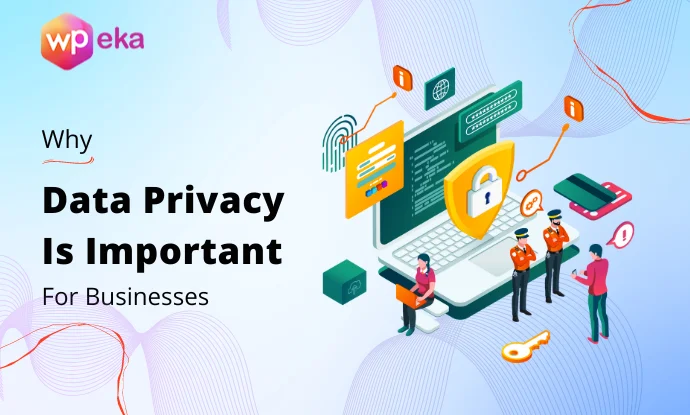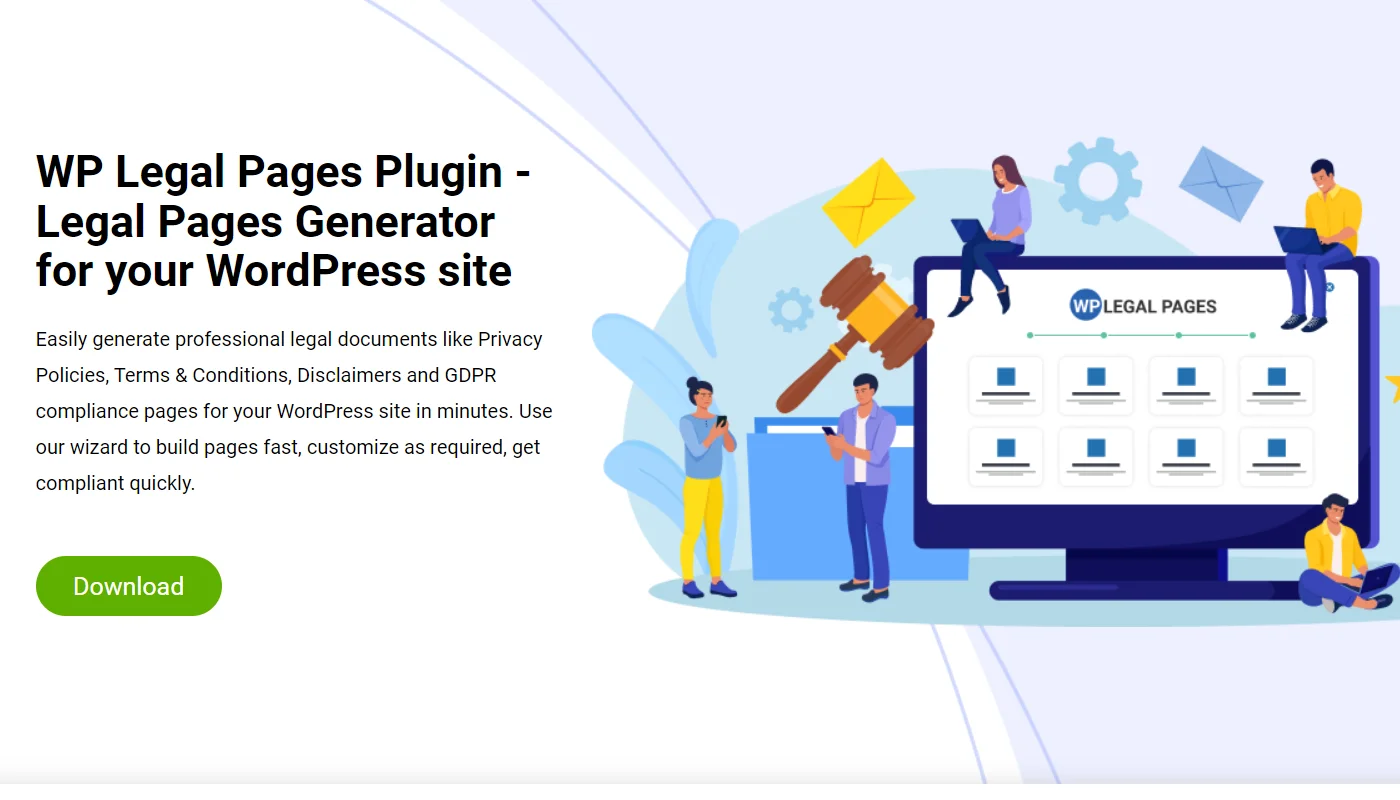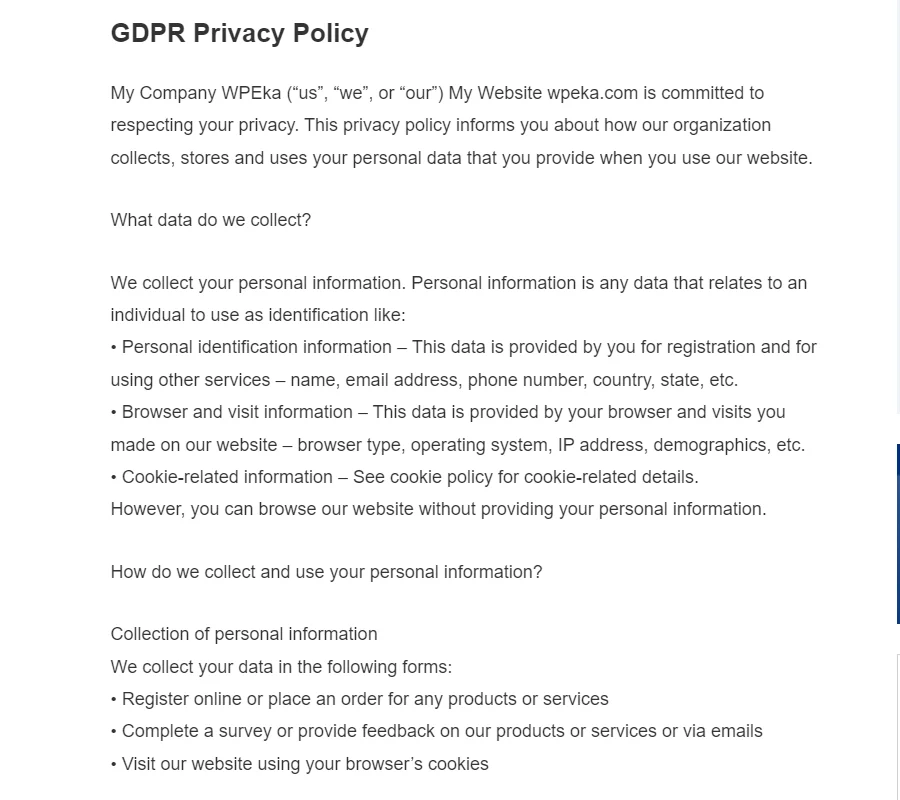7 Reasons Why Data Privacy is Important for Businesses

Why data privacy is important has recently gained much attention as a popular topic of discussion.
Well, these long debates are always backed by the fact of over-growing reliance on technology and tons of data exchange over the internet. This continuous exchange of information has made data privacy concerns more crucial than ever.
This article aims to discuss in detail what is data privacy and security why they are important. We will further discuss, the major laws governing data privacy issues and how can your business comply with these laws.
So, without further ado, let’s get started.
What is Data Privacy?
Basically, data privacy refers to the fundamental right and responsibility of individuals to control the exchange of their personal information.
It includes a set of principles and practices that aim to ensure that personal data is handled securely and accessed only by authorized parties.
The key aspects of data privacy include collection limitations, which limit businesses from collecting only the minimum amount of data necessary for a specific purpose. It requires clearly defining the purpose of data collection and use, ensuring data is used only for the specified purposes, measures to ensure data security, terms governing its third-party usage, and transparency allowing individuals to access, correct, and delete their data upon request.
Upholding the integrity of data privacy is crucial for businesses. It helps maintain customer trust, comply with regulations, and avoid the damaging consequences of data breaches or misuse.
Data Security vs Data Privacy
Often, the term data security is confused with data privacy. While data security and privacy are closely related, they are not the same.
Data security refers to the measures and controls implemented to protect data from unauthorized access, modification, or destruction. This includes using encryption, access controls, firewalls, and other security technologies to safeguard data confidentiality, integrity, and availability.
On the other hand, data privacy focuses on the rights and responsibilities surrounding collecting, using, and storing personal information. Moreover, data privacy is concerned with ensuring that personal data is collected and processed in a fair, transparent, and lawful manner.
How Is Data Privacy Related to Data Security?
Nevertheless, effective data privacy cannot be achieved without robust data security measures.
The relationship between data security and privacy can be understood as symbiotic. Data security enables data privacy protection guidelines for the information businesses collect, is accessible only to authorized individuals, and is not misused or compromised.
Conversely, data privacy principles guide the development and implementation of data security controls, ensuring that personal information is handled in a way that respects individual rights and preferences.
Furthermore, many data privacy regulations, such as the General Data Protection Regulation (GDPR), mandate specific data security requirements that organizations must meet to be compliant.
Businesses must have a comprehensive data protection strategy that addresses both the technological and policy-based aspects of safeguarding data privacy.
Why Is Data Privacy Important For Businesses?

Now, we have a clear understanding of terms related to data privacy and security. Lets now discuss the reasons why data privacy is important for businesses:
1. Builds & Maintains Customer Trust
Data privacy is crucial for building and maintaining customer trust. When customers believe their personal information is secure and handled responsibly by a business, it develops a sense of trust.
This trust further turns into loyalty, as customers are more likely to continue using a service they feel protects their privacy.
Moreover, satisfied customers are likely to recommend the business to others, enhancing its reputation. In contrast, data breaches or mishandling of information can lead to distrust and customer attrition.
2. Helps To Comply With Legal Regulations
Compliance with data privacy regulations is essential for businesses to avoid legal and financial penalties. Various regulatory laws have set strict guidelines for how data should be collected, stored, and processed.
Non-compliance with these laws in the regions where they apply can result in potential losses. This may include hefty fines, legal action, and operational disruptions. Furthermore, it also damages a company’s reputation and hampers customer trust.
3. Mitigates Liability and Risks
Data privacy is crucial for risk mitigation. It protects businesses from the severe consequences and data breaches.
A data breach or cyber attack can result in significant financial losses, including fines, legal fees, and the costs associated with managing the breach and restoring systems. Furthermore, it leads to a loss of customer trust and potential business.
Implementing data privacy measures can help businesses prevent breaches and minimize exposure to these risks.
4. Helps In Gaining Competitive Advantage
Prioritizing data privacy can provide businesses with a significant competitive advantage.
As consumers become more informed about privacy issues, they increasingly prefer companies commitment to protecting personal information. Businesses that implement robust privacy measures can distinguish themselves from competitors who may not be as diligent.
This commitment can be a compelling selling point, attracting privacy-conscious customers. Additionally, a reputation for safeguarding data can enhance brand credibility and trust, leading to increased customer retention and loyalty.
5. Improves Operational Efficiency
Implementing robust data privacy protocols enhances operational efficiency. It ensures secure and streamlined management of data within the business.
Proper privacy measures help organize data storage and processing, reducing redundancies and minimizing errors. This leads to efficient use of resources and improves the accuracy and reliability of data.
Additionally, secure data handling practices also facilitate compliance with regulations. Furthermore, well-structured data privacy protocols can prevent data breaches which might affect the functioning of a business.
6. Protects of Intellectual Property
Data privacy measures are crucial for safeguarding a company’s intellectual property (IP). Protecting IP ensures that valuable company information is not stolen or misused by competitors or malicious actors.
Effective data privacy practices, such as encryption and access controls, prevent unauthorized access and data leaks. This not only preserves the company’s competitive edge but also maintains its market position and profitability.
7. Enhances The Quality Of Customer Insights
Respecting data privacy can enhance the quality of customer insights and personalization. When users trust a business with their personal information, they are likely to share accurate and detailed data.
This ethically collected data allows businesses to gain deeper insights into customer preferences, behaviors, and needs.
Data Privacy Laws and Compliance
Well, we now know why data privacy is important. Let’s now understand about data privacy laws and compliance.
Data privacy laws are designed to protect individuals’ personal information and ensure businesses handle data responsibly and transparently.
Compliance with these laws is crucial for businesses to avoid legal penalties and maintain customer trust. Some of the key data privacy regulations include GDPR, CCPA, PIPEDA, and COPPA. Let’s discuss each of their specific requirements and scopes.
GDPR (General Data Protection Regulation)
GDPR is a comprehensive data protection law enacted by the European Union. It applies to all organizations processing the personal data of EU residents, regardless of the business’s location. The key provisions of the GDPR include:
- Consent: Businesses must obtain clear and explicit consent from individuals before collecting their data.
- Data Subject Rights: Individuals have rights to access, correct, delete, and transfer their data.
- Data Protection Officers (DPOs): Certain organizations must appoint a DPO to oversee data protection efforts.
- Breach Notification: Companies must notify authorities and affected individuals of data breaches within 72 hours.
- Fines: Non-compliance can result in fines up to €20 million or 4% of annual global turnover, whichever is higher.
CCPA (California Consumer Privacy Act)
The CCPA is another landmark privacy law governing the data privacy policy in the United States, specifically protecting Californian residents. Its key aspects include:
- Consumer Rights: Californians have the right to know what personal data is being collected, to whom it is sold, and to access, delete, or opt-out of the sale of their data.
- Disclosure Requirements: Businesses must provide clear privacy policies and notify consumers about data collection practices.
- Do Not Sell My Info: Companies must offer a visible link on their website for consumers to opt-out of the sale of their personal information.
- Fines and Penalties: The CCPA imposes fines of up to $7,500 per intentional violation and $2,500 per unintentional violation.
PIPEDA (Personal Information Protection and Electronic Documents Act)
PIPEDA governs how private sector organizations handle personal information in Canada. Its key requirements include:
- Consent: Organizations must obtain meaningful consent for the collection, use, and disclosure of personal information.
- Access and Correction: Individuals have the right to access and correct their personal information.
- Accountability: Organizations must designate an individual responsible for compliance with PIPEDA.
- Safeguards: Companies must protect personal information with appropriate security measures against risks like loss, theft, and unauthorized access.
- Breach Notification: Organizations must report breaches that pose a significant risk of harm to affected individuals and the Privacy Commissioner of Canada.
COPPA (Children’s Online Privacy Protection Act)
COPPA is a U.S. federal law enacted to protect the privacy of children under 13 online. Key provisions include:
- Parental Consent: Websites and online services must obtain verifiable parental consent before collecting, using, or disclosing personal information from children under 13.
- Privacy Policy: Businesses must post a clear and comprehensive privacy policy describing their information practices for children’s data.
- Data Minimization: Only collect as much data as necessary for participation in the activity.
- Security: Implement measures to maintain confidentiality, security, and integrity of children’s personal information.
- Right to Review: Parents have the right to review and delete their children’s personal information.
How WP Legal Pages Can Help With Data Privacy

Your business or website requires a privacy policy page to comply with amended laws to protect individual privacy.
However, creating the page is not very easy. It requires you to meet various technical aspects, which may require you to hire legal professionals and can cost you with your money and time.
WP Legal Pages is a popular WordPress plugin that simplifies and streamlines the process of creating a privacy policy page for your website. It allows you to create and manage your website’s legal pages effortlessly.
The plugin offers over 25 customizable legal templates to help you create various legal pages for your website, including a privacy policy. It integrates with popular cookie consent software to help websites comply with data protection regulations like GDPR, CCPA, and other global laws.
Furthermore, the plugin is simple to use. It supports an intuitive wizard that helps you design a privacy policy from start to finish. All you need to do is download the plugin and sign up. Next, the wizard will walk you through a questionnaire to help you create a blog privacy policy.
Sample Privacy Policy for Blog
Check out the sample privacy policy of WPEka.

The WP Legal Pages can help you build a similar privacy policy page.
FAQ
Data privacy is important for businesses to maintain customer trust, comply with regulations, and protect sensitive information from breaches that can lead to financial and reputational damage.
Data privacy in business refers to the practices and policies companies use to protect the personal and confidential information of their customers, employees, and other stakeholders from unauthorized access, use, or disclosure.
The major data privacy laws include the GDPR in the EU, the CCPA in California, the COPPA in the US for children, and the PIPEDA in Canada, which mandate how businesses must handle and safeguard personal data.
Conclusion
Safeguarding users’ data is every business’s fundamental responsibility. Prioritizing data privacy is a strategic move that can benefit in the long run.
This article has covered in detail why data privacy is important for your business and what benefits it provides.
If you liked this article, you might also consider reading:
- How To Add Privacy Policy In WordPress
- Best Privacy Policy Generators For Your Website
- Navigating Global Data Privacy Regulations
Check out the WP Legal Pages plugin and create your own privacy policy page today.


Leave a Reply